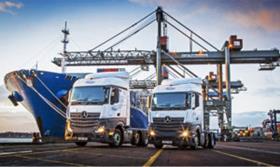Wincanton has reported a strong set of financial results for the year to 31 March 2020, with revenue up 5% to £1.2bn and pre-tax profits up 7% to £52.9m, driven by a 26% rise in revenue from its retail grocery division which picked up a sizeable contract with Morrisons in June 2019 that has just been extended.
Shares rose 10p to 195p on the announcement but are still well off the peak of over £3 in February before the Covid-19 pandemic struck.
Chief financial officer Tim Lawlor said he was not happy with Wincanton’s share price but the group had no plans to take the business private.
“We are an under-valued stock but all we can do is demonstrate we are worth more,” he said. “At the start of the lockdown the Wincanton share price fell like everyone else’s. We then issued a statement saying it was not so bad for us because of the diversification of our portfolio and there was a correction.
“Then at the beginning of April we saw a cliff edge in some of our closed book contracts when all the construction sites shut down and we had to suspend our two-man home delivery network, so we saw a 15% drop in revenue year on year. The other thing is that we suspended our dividend so we are a less attractive proposition than a company that is paying a dividend.
“The underpinning strength of Wincanton will not change post-Covid-19 because goods will still need moving and with some of the opportunities that are emerging we could be a net winner coming out of this.”

Chief executive James Wroath, pictured, said that Wincanton has been “very open” about the effect of Covid-19 “and the market has penalised us for that”.
But he insisted that there were no plans to take the company off the stock market. “We believe we can convince the market that this is a good business to invest in,” he said. “The other issue is the lack of comparisons as there are only two other listed businesses like us – Clipper and Stobart – so we suffer from that. We go into more detail and are more transparent to try to educate people about what we do and what the potential is for the business.”
Wroath, appointed in September last year on the retirement of his predecessor Adrian Colman, has now completed his strategic review of the business and has “refocused strategic direction and organisational structure” to continue to grow the business. But the current year got off to a slow start with revenue down 10% due to the lockdown that began on 23 March.
“The strategy we came up with before Covid has not been changed by Covid,” he said. “It was not a big change from what Wincanton was doing before but the focus is now on more growth in better margin markets. The three we are highlighting are:
"First, infrastructure, where we have a big engagement with EDF to help them build Hinckley Point. We believe post-Brexit and post-Covid the government will invest more into infrastructure and there are enormous amounts of logistics that go into these projects – even small projects can have over £10m logistics spend per year and something like Hinckley Point has a lot more than that;
"The second is retail, where we are a big box, high quality logistics player handling very complex operations and I believe we can move more into ecommerce for small to medium organisations whose choices today for logistics are limited to either doing it themselves which is not scalable, they can go for Amazon which is great logistically but they have to give up a lot of control of the customer experience or they can go to a number of small 3PLs.
"I believe we can use our big box retail reputation to provide Amazon quality logistics but without asking our customers to give up their customer experience.
"The other area of interest are dark stores or efulfilment centres where customers which are doing local home delivery - like supermarkets – will today often fulfill that out of their own stores, but there is limited capacity for the thousands of orders a day that need to be picked. They don’t want that getting in the way of their retail customers so they are moving towards stores that are only for packers not customers to go into.
"That’s a big opportunity for us because while a grocer might not want us running a retail store for them a dark store is really a logistics operation. That could include us doing the final mile delivery – in the grocery sector everybody does that themselves and nobody has subcontracted it. Ocado is the only different model but it is not a 3PL so if we had an opportunity to do the home delivery we would absolutely want to.
"We already have experience in that with our two-person delivery service and while Ocado is not an acquisition target, ecommerce in general is the area we are most interested in inorganic growth because it is slower to build it than to buy it;
"The final area is digital transport marketplaces that connect the carrier with the shipper. As a big 3PL and 4PL that is something we are going to be increasingly interested in.”

The company is already seeing “signs of gradual increase in activity levels” in its worst affected divisions, construction and transport services which includes containers, and May revenues were up 7% on April.
Wroath said: “Wincanton delivered another year of strong performance in 2019/20, since when the Covid-19 crisis has created significant challenges for the group and our customers. The measures we have implemented have ensured great service has continued during the crisis period and opportunities for future growth have continued to emerge. Furthermore, profitability continues to recover as our sectors return towards normal levels of activity.
“The overall direction of our strategy following my initial review has not been altered by Covid-19. Wincanton has a strong business model with an experienced management team, diversified service offerings and an excellent reputation. I expect to use this foundation as a springboard for growth to drive even greater success in the future.”
The effect of Covid-19 on the company’s profits this year is still hard to assess. In a detailed statement on the pandemic, the company said: “The profit impact of the volume movements has varied according to contract types, but as a whole the group has seen a disproportionate impact to its profitability in the financial year to date due to the areas impacted tending to be closed book operations. Encouragingly, however, profits increased in May as it was largely these closed book operations that underpinned the month on month revenue growth. It remains too early to confidently estimate the financial impact of the Covid-19 crisis on the group's full year results and there remains uncertainty regarding the levels of demand and business interruption for the remainder of the year.
“At the onset of the Covid-19 crisis, we saw an increase in volume and demand from both our grocery and consumer products customers as consumers prepared for the lockdown. Both areas have now returned to the volumes we would expect at this time of year. In non-grocery retail, volumes have remained lower than the prior year periods reflecting a focus on 'essential' products and the lockdown impact on shopping habits. The open book nature of most of the contracts in this area has ensured that profitability has not been significantly impacted by the volume movements.

“In our closed book two-person home delivery network we were required to cease operations at the end of March in line with safety guidelines, resulting in a significant negative impact on profitability during the shutdown. The service restarted in May and initial volumes have been encouraging.
“Our construction business (representing 11.5% of group revenue in 2019/20) saw major parts of the network closed at the start of April. Revenue during April was down by around 70%. There was some benefit from construction sites starting up activity in May with an increase in revenue, but volumes were still over 50% down on the prior year and indications are that the return of volumes will be gradual. Despite swift action to reduce the variable elements of the cost base, the reduction in revenue had a substantial impact on profitability in these largely closed book contracts.
“Container volumes and Pullman Fleet Services revenue continue to be below expectations, with the container business impacted in April by reduced traffic from Asia and latterly by reduced consumer demand in the UK. Workshop volumes have been depressed by general lower demand for vehicle maintenance and repairs as a result of less road activity during the lockdown period. Our energy business has also experienced some slowdown due to reduced retail forecourt fuel volumes in April and May, although we are starting to see some signs of increasing demand as the country moves out of lockdown.”
While container haulage has been a low margin business for quite a while, Wroath said for the time being this was something Wincanton was “prepared to live with”. “There are some things we can do internally around containers and fleet services to create more of a portfolio sale,” he went on. “On the Morrisons business which we were awarded last year we have just signed a contract to double that business with them. That includes primary transport services and vehicle maintenance units – that’s an example of where we can have more of a portfolio sale to help some of those businesses that have struggled in the past couple of years. Most of the container traffic coming into this country is going into the big retailers that we service in the other part of our business. We will continue to monitor it as there are tough market conditions that may mean we have to do something different but for the time being that is not in our plans.”
To ensure the business had the liquidity to cope with the pandemic, the management has suspended all non business-critical expenditure including bonus payments, cut pay by 20% for the board and executive management and taken lease payment holidays where possible. It has taken advantage of government initiatives including the deferral of VAT payments and furloughed up to 2,500 employees, 15% of the workforce.
The company will not be paying a final dividend to shareholders.
In his review, chairman Martin Read said: “Given the effects of Covid-19, it is difficult to provide a reliable outlook statement for the coming year. However, logistics are crucial for most of our customers and for the country in general so we do not expect persistent and widespread major falls in the demand for our services. We are highly conscious of the need to manage cash carefully and have taken a number of measures to maintain liquidity within the business. All that said, in the medium to long term, we continue to see excellent opportunities for Wincanton.”
Read added that the management had taken a detailed look at the possible acquisition of Eddie Stobart Logistics last autumn and had concluded that the “underlying profitability of Eddie Stobart and the ongoing liquidity concerns would not enhance Wincanton’s shareholder value”.
“Having spent a number of years getting our own business back onto a sound financial footing, we did not want to take disproportionate risks with its future,” Read said. “We will continue to look for opportunities to grow our business inorganically but only where we feel that the balance of risk and reward makes sense.”
Wincanton expects it will not be “materially affected” by Brexit in December 2020 as its operations are generally delivered locally in-country and are not “critically dependent” on a cross-border supply chain or workforce.













